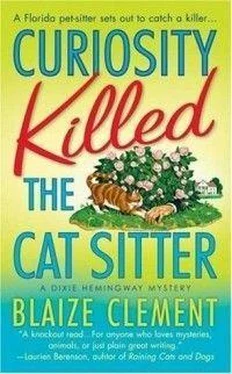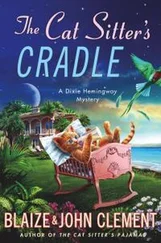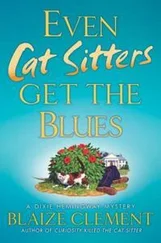For a while, I thought I might like to move away from the key and all its memories, but Michael and Paco talked me into taking the apartment over the carport, and I’m glad they did. This is where my heart is. It’s where I belong. Now occasional rips in the fabric of reality come when I least expect them. I can be going along minding my own business, attending to responsibilities, bathing and dressing and feeding myself like a normal person, and then one day I’ll see Todd walking down the sidewalk ahead of me. I’ll know it’s him, the same way I recognize my own reflection in a mirror. It’s his hair, his shoulders, his long legs. I know his walk, the way he swings his arms a little off rhythm with his steps. I’ll open my mouth to shout to him, my heart flowering with a burst of pure joy, and then he changes into somebody else—a man I don’t know at all, a man totally unlike Todd, and I am weak-kneed and dizzy with disappointment and fear.
It has been three years. I am long past the time grief experts allow for normal grieving. Mine is pathological, they say, and it’s time I got over it. They don’t explain how to do that. They merely look at me with tight lips and annoyed eyes and tell me I have to. I would if I could, believe me, because every time it happens, I fear that next time I won’t realize it’s a delusion and that I’ll actually rush up to a stranger and throw my arms around him and take comfort in his foreign smells, his alien substance. If that ever happens, I may never return.
I drank a bunch of water and called the hospital again, and this time they gave me the nurses’ station on Phillip’s floor. A harried nurse told me he was “resting comfortably”—whatever that meant—and got off the phone before I could ask if I could see him. I called Guidry again and left another message for him to call me on my cell, then I ate a little tub of yogurt from the fridge while I stood on the porch and looked out at the glittering waves in the Gulf and told myself everything would work out all right. Phillip would recover from his injuries, Guidry would find whoever killed Marilee and Frazier, and I would find a good home for Ghost. Life would go on, and so would I.
After I took a shower and put on fresh shorts and T and Keds, I went to my office–closet and took care of business, entering records on my file cards and returning calls. A man had left a message asking me to take care of his python, and I called him up and gave him the name of another pet-sitter, one who isn’t squeamish about feeding live mice to reptiles. Somebody else wanted to know if I knew how to hatch eggs laid by a dove on their front lawn, and I gave them the number of the Pelican Man. I figured anybody who has devoted his life to rescuing injured pelicans must know how to hatch dove eggs. When I’d gotten my books in order and all my invoices ready, I got in the Bronco and drove to the Kitty Haven to visit Ghost.
He was in one of Marge’s private rooms, which is to say he was in a cubicle about three feet wide, six feet deep, and eight feet tall, with a sleeping basket, a scratching post, padded shelves at several levels, and a kitty door low in the back to his private toilet. A screened door across the front had a hinged insert to allow the attendants to move food and water in and out without letting Ghost escape. It was an ingenious setup, but it was still a cell, and he knew it.
Like all Abyssinians, Ghost had a muscular body and the slender head and almond eyes characteristic of cats that originated in Asia. Abys are a highly intelligent breed, and once an Aby falls in love with you, it’s one of the most loyal animals in the world. Ghost had been with Marilee since he was twelve weeks old, and as far as he was concerned, she was his everything. I took him into the visitors’ room and brushed him and played Chase the Peacock Feather with him, but both of us were off our game. I finally sat down cross-legged on the floor in a dejected heap, and Ghost climbed into my lap and curled himself between my legs. Without his charm-trimmed velvet collar, he looked even more forlorn and orphaned.
I ran my fingertips over his ticked silver fur and said, “Things are bad, Ghost. Really bad. Marilee’s not coming back, and Phillip has been beaten up. Maybe to scare him so he won’t tell all he knows about what happened at your house. You know what it is, don’t you? You know who he saw that morning.”
He sighed and closed his eyes and laid his chin on my knee, as if he were worn-out from the heaviness of knowledge he couldn’t express. He had known all along that Marilee was dead. As an eyewitness to two grisly murders, he could identify the killer or killers of both Marilee and Harrison Frazier. He just couldn’t do it in words.
“Don’t worry,” I whispered. “I’ll make sure you have a good home.”
He opened his eyes and gave me a look of hurt accusation, and I couldn’t blame him. This had happened on my watch, and I had let him down.
I slipped him some kitty treats when I left, and promised him I would come back and get him as soon as Lieutenant Guidry said I could. Even with Marilee dead, there was no reason he couldn’t stay in his own home until I could find him another one. He gave me a glum look and whirled his head to the base of his tail and gnawed at it. I wasn’t sure what that meant in cat language, but I was pretty sure it wasn’t something nice.
Just as I was getting in the Bronco to make the rest of my afternoon visits, my cell rang—Guidry finally returning my calls.
I said, “Phillip Winnick saw a woman leave Marilee Doerring’s house about four o’clock Friday morning. He says she got in a black Miata and drove off. He didn’t tell you before because he doesn’t want his parents to know he was out of the house at that hour.”
“When did he tell you this?”
“I saw him at the Crab House last night and he told me then. But there’s more. Did you know I found him beaten up this morning?”
“Yeah, I know.”
I didn’t ask him if he knew about Marilee. Of course he knew.
I said, “I think somebody didn’t want him to tell what he saw.”
Guidry was silent for a moment, and I could almost hear his brain digesting what I’d told him, along with its implications.
He said, “Can you meet me at Sarasota Memorial in the next ten minutes?”
Before I could stammer out an answer, he said, “In the main lobby,” and hung up.
I stared at my phone for a few seconds, then flipped it closed and started the Bronco. Guidry always seemed to be one step ahead of me, and I wasn’t sure whether I liked that or hated it.
At the hospital, I left the Bronco for a valet to park, then hurried past a group of hospital personnel out on the sidewalk for a cigarette break. As I veered round them, they all gave me the defiantly sullen looks that smokers have acquired. Wide automatic glass doors slid open for me, and I went through to the lobby, my eyes searching for a man who looked too rich and well dressed to be a homicide detective. A hand touched my arm and Guidry said, “He’s on the fifth floor.”
He steered me to the wall of elevator doors, and when one opened and vomited a gaggle of glassy-eyed people, we took their place. Some other people got on with us, and we all stood tensely silent as the elevator began its smooth upward glide. Guidry and I stood at the back, not speaking or touching as some people got off and other people got on at every floor.
Finally, Guidry said, “This is our floor.”
He touched the small of my back with his fingertips, and I moved forward. A glass wall on our right showed a large waiting room where people were sitting staring straight ahead, each of them caught in a timeless worry.
I followed him down the hall to the ICU wing, where glassed cubicles were arranged in a circle around a busy nurses’ station. A uniformed deputy sat in a straight wooden chair outside Phillip’s cubicle. Phillip’s bed was slightly elevated so his face was visible. It looked like a cut of raw meat. His eyes were swollen shut, his nose was bandaged, and his cheeks were wider than his head. A ventilator’s blue accordion hose was taped inside his mouth, and an IV stand stood beside his bed. A couple of machines that looked like apartment-sized washer–dryer combinations stood behind him. Tubes snaked from them and disappeared under the sheet covering him.
Читать дальше












